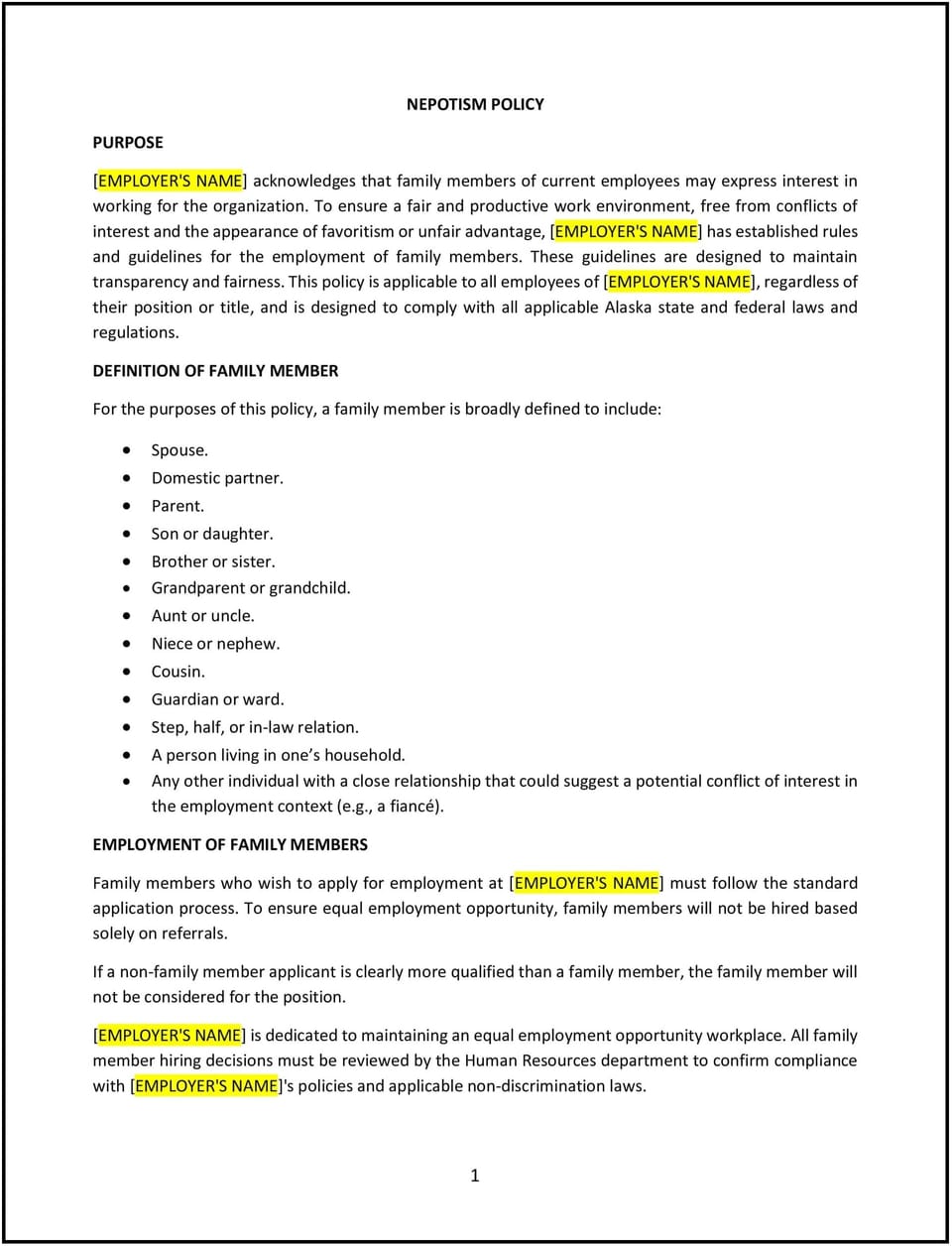Nepotism policy (Alaska): Free template

Nepotism policy (Alaska)
In Alaska, a nepotism policy provides guidelines to ensure fair and unbiased employment practices by addressing the hiring and management of relatives or close personal relationships within the workplace. This policy aims to prevent conflicts of interest, favoritism, and perceptions of unfairness while promoting transparency and equal opportunities for all employees. By implementing this policy, businesses can foster a professional and merit-based workplace culture.
Given Alaska’s unique workforce characteristics, such as smaller labor markets and tight-knit communities, businesses may need to adapt the policy to address specific challenges related to hiring and supervision.
How to use this nepotism policy (Alaska)
- Define relationships covered: Clearly outline the types of personal relationships covered by the policy, such as family members, romantic partners, or close friendships.
- Address hiring procedures: Specify guidelines for hiring individuals with personal connections, such as requiring additional levels of approval or oversight to ensure fairness.
- Set supervision restrictions: Prohibit direct supervision or reporting relationships between employees with personal connections to prevent conflicts of interest.
- Establish disclosure requirements: Require employees to disclose personal relationships that may fall under the policy to HR or management for review.
- Outline enforcement measures: Include consequences for violations, such as reassignment of duties, disciplinary actions, or termination, to ensure adherence to the policy.
Benefits of using a nepotism policy (Alaska)
A nepotism policy provides several advantages for businesses in Alaska. Here’s how it helps:
- Promotes fairness: Ensures employment decisions are based on merit rather than personal relationships, fostering trust among employees.
- Prevents conflicts of interest: Reduces the risk of favoritism or bias in hiring, promotions, or performance evaluations.
- Enhances transparency: Encourages open communication about personal relationships that could impact workplace dynamics.
- Supports compliance: Helps businesses adhere to equal employment opportunity (EEO) laws and avoid claims of discrimination or favoritism.
- Builds professional culture: Reinforces the company’s commitment to creating a merit-based and inclusive workplace environment.
Tips for using a nepotism policy (Alaska)
- Tailor for small communities: Consider the unique challenges of Alaska’s smaller labor markets and adapt the policy to balance workforce needs with fairness.
- Use objective hiring criteria: Ensure that all hiring decisions are based on transparent and measurable qualifications, regardless of personal connections.
- Monitor workplace dynamics: Regularly review situations where personal relationships exist to prevent conflicts of interest or perceptions of favoritism.
- Provide training: Educate managers and employees on the importance of impartiality in employment decisions and the role of the policy.
- Review regularly: Update the policy to reflect changes in workforce dynamics, industry practices, or legal requirements.
Q: How can I address potential conflicts of interest when hiring relatives?
A: Implement additional approval processes, ensure hiring decisions are based on objective criteria, and avoid placing relatives in direct reporting relationships.
Q: What types of relationships are covered under this policy?
A: The policy typically covers immediate family members, romantic partners, or close friendships that could create conflicts of interest in the workplace.
Q: How should employees disclose personal relationships?
A: Employees should notify HR or management in writing as soon as they become aware of a relationship that may fall under the policy.
Q: What actions can businesses take to resolve nepotism issues?
A: Options include reassigning duties, implementing additional oversight, or taking disciplinary measures if policy violations occur.
Q: How often should this policy be reviewed?
A: The policy should be reviewed annually or whenever significant changes occur in company operations, workforce practices, or legal standards.
This article contains general legal information and does not contain legal advice. Cobrief is not a law firm or a substitute for an attorney or law firm. The law is complex and changes often. For legal advice, please ask a lawyer.


